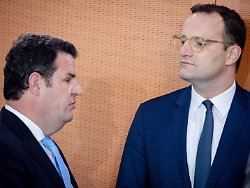Monday, May 03, 2021
Campaign mode instead of cooperation
Spahn and salvation clash during care
Minister of Labor Heil presents a draft law according to which wages in the care of the elderly should be increased. Health Minister Spahn angry when he rushes ahead. The Verdi union is demanding a solution and is calling on both of them to “get out of campaign mode”.
When it comes to collective wages for nursing staff, there is movement: Federal Minister of Health Jens Spahn is aiming for a law in this legislative period. A lot of speed is currently being made on the subject of climate protection, the nursing staff “deserved just as much speed,” said Spahn in Berlin. At the same time, he called it “sad” that Labor Minister Hubertus Heil from the SPD had proposed his own law at the weekend. The Verdi union criticized the coalition dispute.
Spahn said that Heil’s advance was not known to his ministry. The topic is far too important “to be linked to such maneuvers,” he criticized his cabinet colleagues. Spahn pointed out that his department had already made a proposal weeks ago for regular tariff payments in inpatient and outpatient care for the elderly.
In the draft of the Minister of Labor Heil for a “care tariff loyalty law” it is provided that supply contracts should only be concluded with care institutions that pay their employees in the care and support sector a wage that is agreed in collective agreements or church labor regulations. In the case of institutions that are not bound by collective bargaining agreements, the payment must not fall below the level of the collective agreement. “A higher wage than that provided for in the applied collective agreement is permissible,” the draft continues.
According to Spahn, it is possible to make payment in line with the collective agreement a condition for signing a contract with long-term care insurance. The Ministry of Health will now make concrete proposals to the coalition groups. Then the Bundestag would have to decide “whether it wants to implement this before the election or not”. Spahn emphasized: “I can only advertise it.”
“A solution is needed now”
SPD parliamentary group vice Katja Mast rejected Spahn’s criticism of Heil’s advance and, for her part, accused Spahn of not having made a “solid funding proposal” for improving the position of nursing staff. Mast warned against “playing off caregivers against those in need of care”.
The Verdi union called on the federal government to resolve the coalition dispute over higher wages for elderly care. “We need a solution now,” said Verdi boss Frank Werneke. Nursing workers would have no understanding if their demands for more recognition of their work were “drowned out” in the election campaign. DGB board member Anja Piel accused Spahn of not having kept previous promises.
“I call on Messrs. Heil and Spahn to leave the election campaign mode and immediately improve the conditions in nursing for everyone. Sunday speeches are of no use to those affected, they must finally see action,” demanded the left-wing politician Pia Zimmermann.
The German Nursing Council strongly urged better working conditions for carers. Otherwise, the care emergency will worsen after the pandemic, warned the deputy chairwoman Christine Vogler on ZDF.
The social association Diakonie welcomed the advance of Salvation. “A collective agreement law would mean: collective bargaining for everyone – regardless of whether they are public, private, church or other care providers oriented towards the common good,” explained Diakonie President Ulrich Lilie. “We expect the government parties to agree on a regulation that obliges employers in the care sector to pay collective wages,” demanded Caritas President Peter Neher.
.
